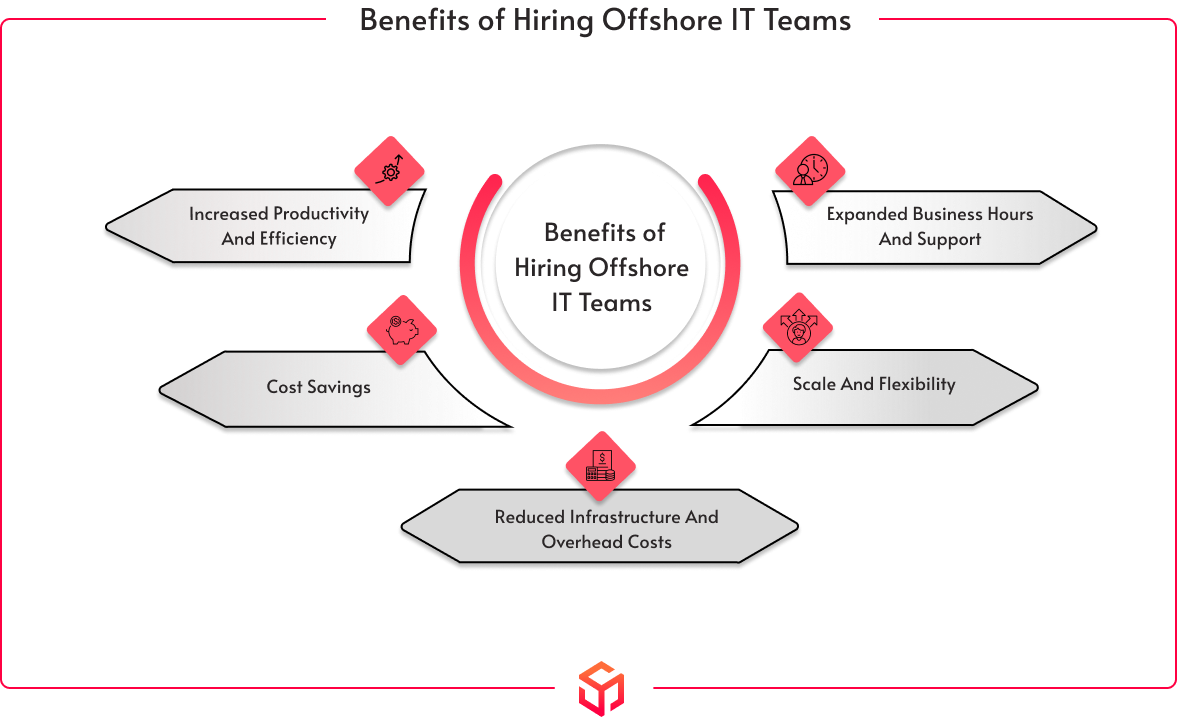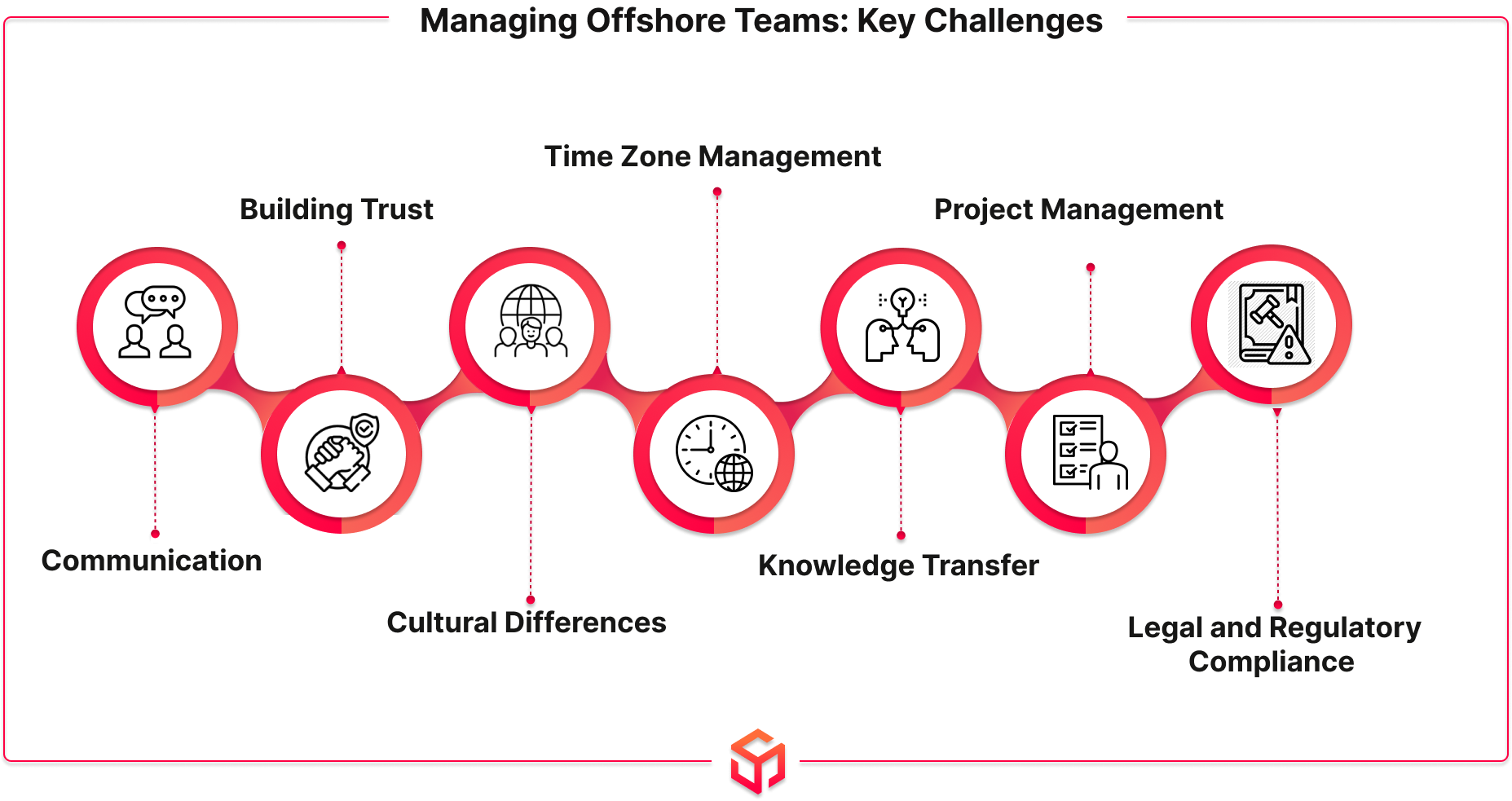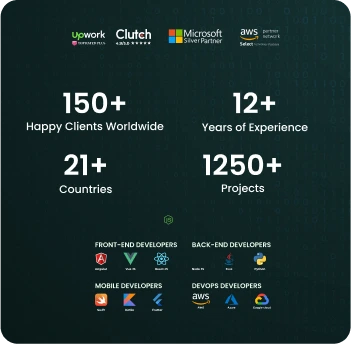Table of Contents
Offshore development teams have gained popularity in the IT industry due to several reasons. They offer access to a diverse range of talented professionals from around the world. Provide cost-effective solutions, and enable round-the-clock productivity. However, managing these teams can be challenging.
This guide aims to help you effectively build and manage an offshore development team, ensuring successful outcomes for your projects.
The Benefits of Hiring Offshore IT Teams
Hiring offshore IT teams can offer several benefits to organizations. They can easily overcome the risks involved when hiring the offshore team for your project. Here are the key advantages:
Cost savings
One of the primary reasons businesses opt for offshore IT teams is cost savings. Offshore teams are often in countries with lower labor costs. Which can cause notable savings compared to hiring an in-house team or outsourcing locally. This can benefit startups, SMBs, or companies operating on a tight budget.
Access to a larger talent pool
By hiring offshore team management, organizations gain access to a larger pool of global talent. This allows companies to tap into a diverse range of skills and expertise that may not be available locally. Offshore teams often have experience working with international clients and may bring fresh perspectives and innovative ideas to the table.
Increased productivity and efficiency
Offshore IT teams can help boost productivity and efficiency within an organization. They can take over non-core tasks or specific projects with agile development. This allows the in-house team to focus on core business activities.
Offshore teams often operate in different time zones, allowing for round-the-clock work. This agile process results in faster project delivery and reduced time-to-market.
Scale and flexibility
Offshore IT teams provide scale and flexibility to organizations. As business requirements change, they can quickly scale up or down the team size according to project demands. With this agile practice, businesses can adapt to market conditions quickly. With no extensive recruitment or downsizing processes and maintaining flexible employee schedules.
Expanded business hours and support
Offshore IT teams can provide extended business hours and support, especially if they are in different time zones. This can be helpful for companies that offer customer support. Ensure that there is always someone available to assist customers regardless of their location and time zone.
Reduced infrastructure and overhead costs
Hiring offshore software development teams minimizes the need for additional infrastructure and overhead costs. Companies do not have to invest in office space, equipment, or utilities for the offshore team, leading to cost savings. This is beneficial for dedicated remote teams, as they can work from their own offshore development centers in their location, reducing the need for physical office space.
The Best Way to Maximize Offshore IT Team Productivity
To maximize offshore IT team productivity, you can use various productivity tools that enable effective communication, collaboration, and project management. Here are some commonly used tools:
Communication and Collaboration
Slack: Slack is a Real-time messaging, file-sharing, and collaboration tool for teams.
Zoom or Microsoft Teams: Video conferencing tools for virtual meetings, screen sharing, and remote collaboration.
Google Workspace or Microsoft Office 365: Cloud-based productivity sites that offer document sharing, editing, and real-time collaboration features.
Trello or Asana: Project management tools that help in tracking tasks, assigning responsibilities, and monitoring progress.
Task Management
Jira or Trello: Agile project management tools that allow you to manage tasks, assign priorities, track progress, and visualize workflows.
Basecamp or Monday.com: A project management platform for task allocation, project scheduling, and team collaboration.
Todoist or Wrike: Task management tools that help in organizing individual and team tasks.
Code Collaboration and Version Control
GitHub or Bitbucket: Web-based platforms for version control and collaboration on code storage.
GittLab: A DevOps platform that provides code hosting, CI/CD pipelines, and collaboration features.
Time Tracking and Productivity Analysis
Time Doctor or Toggl: Time tracking tools that help measure individual and team productivity, allocate resources, and identify bottlenecks.
RescueTime: A productivity monitoring tool that tracks time spent on different apps and websites, providing insights to optimize work habits.
Knowledge Sharing and Documentation
Confluence or Notion: Collaboration tools for creating, organizing, and sharing project documentation, team knowledge bases, and wikis.
Google Drive or Dropbox: Cloud storage platforms for securely storing and sharing files, documents, and other digital assets.
Managing Offshore Teams: Key Challenges
How to overcome the challenges of hiring an offshore team? Managing offshore teams can be a rewarding experience, but it also poses some unique challenges. Here are some key challenges that you may encounter and suggestions on how to address them:
Here are some key points on managing offshore teams effectively
 Communication
Communication
- Establish clear and consistent communication channels such as video conferencing, emails, and project management software.
- Encourage regular check-ins and promote open communication to bridge any gaps.
- Be sensitive to time zone differences and find overlapping working hours for real-time collaboration.
Building Trust
- Encourage team-building activities and virtual icebreakers to foster a sense of rapport and collaboration.
- Assign a dedicated onshore point of contact who can visit the offshore team to build personal connections and trust.
Cultural Differences
- Promote cultural awareness and sensitivity to encourage open discussions about cultural differences.
- Provide opportunities for team members to learn from each other, creating a more inclusive and collaborative working environment.
Time Zone Management
- Identify overlapping working hours to enable real-time collaboration.
- Clearly define and communicate expectations regarding response times and availability.
- Use scheduling tools to facilitate coordination between teams.
Knowledge Transfer
- Implement a robust documentation process and use knowledge-sharing platforms.
- Encourage the recording of meetings and discussions.
- Conduct regular training sessions and establish mentorship programs to ensure smooth knowledge transfer within the team.
Project Management
- Use project management tools to track progress, allocate tasks, and monitor deadlines.
- Clearly define roles and responsibilities and establish achievable milestones.
- Regularly review progress, provide constructive feedback, and address concerns promptly.
Legal and Regulatory Compliance
- Understand and comply with the relevant laws and regulations related to data security, privacy, intellectual property, and labor practices when working with remote teams.
By implementing these practices, you can effectively manage offshore teams, promote collaboration, and achieve successful project outcomes.
How can Soft Suave assist you in achieving your goals?
At Soft Suave, we understand the challenges of managing offshore development teams. Our expertise in offshore software development services can help you overcome these challenges and succeed in your projects. Hire dedicated remote developers to get various services. Including dedicated offshore teams, agile software development, and tailored solutions to meet your specific requirements.
Conclusion
Managing an offshore development team requires careful planning, effective communication, and building strong relationships. Partnering with a reliable offshore software development company like Soft Suave can maximize productivity and ensure successful projects. Our experienced team, expertise, and commitment to collaboration make them an ideal choice for top-quality software development services.
Are you looking to Hire Offshore Development Team Now?
Our team of experienced developers can help you build high-quality software solutions that meet your business needs.
Offshore software development services refer to the practice of hiring development teams in different countries. To build software and provide related services. It allows companies to access a larger talent pool, cost advantages, and specialized expertise.
To manage an offshore development team,
- Establish effective communication channels,
- Assign a dedicated project manager,
- Foster a collaborative work environment,
- Use project management tools,
- Regularly review progress and provide feedback,
- Ensure cultural understanding,
- Consider time zone differences, and
- Protect your intellectual property rights.
To work with offshore developers,
- Define project requirements clearly,
- Choose the right offshore development company,
- Establish effective communication channels,
- Assign a dedicated project manager,
- Foster collaboration,
- Use project management tools,
- Review progress regularly,
- Ensure cultural understanding,
- Consider time zone differences,
- Protect your intellectual property rights.
- Regularly review progress and provide feedback,
- Ensure cultural understanding,
- Consider time zone differences, and
- Protect your intellectual property rights.






 Communication
Communication 8 Years of experience
8 Years of experience



